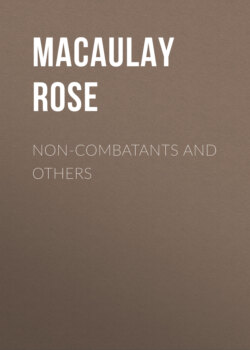Читать книгу Non-combatants and Others - Macaulay Rose - Страница 8
На сайте Литреса книга снята с продажи.
2
ОглавлениеTwo miles up the path a side-track led off from it, and this the donkey-cart took, till it fetched up in a little yard. Alix climbed out, unharnessed the donkey, put him to bed in a shed, collected her belongings, and limped out of the yard, leaning a little on the ivory-topped stick she carried. She had had a diseased hip-joint as a child, which had left her right leg slightly contracted.
She came round into a garden. It smelt of wallflowers and the other things which flower at the end of April; and, underneath all these, of pines. The pine-woods came close up to the garden's edge, crowding and humming like bees. Pine-needles strewed the lawn. The tennis-lawn, it was most summers; but this summer one didn't play tennis, one was too busy. So the lawn was set with croquet hoops, a wretched game, but one which wounded soldiers can play. Dorothy used to bring them over from the hospital to spend the afternoon.
An oblong of light lay across the lawn. It came from the drawing-room window, which ought, of course, to have been blinded against hostile aircraft. Alix, standing in the garden, saw inside. She saw Dorothy, just in from the hospital, still in her V.A.D. dress. The light shone on her fair wavy hair and fair pretty face. Not even a stiff linen collar could make Dorothy plain. Margot was there too, in the khaki uniform of the Women's Volunteer Reserve; she had just come in from drilling. She usually worked at the Woolwich canteen in the evenings, but had this evening off, because of John. She was making sand-bags. Their mother, Alix's aunt Eleanor, was pinning tickets on clothes for Belgians. She was tall and handsome, and like Alix's mother, only so different, and she was secretary of the local Belgian Committee (as of many other committees, local and otherwise). She often wore a little worried frown, and was growing rather thin, on account of the habits of this unfortunate and scattered people. One of them had been their guest since November; she was in the drawing-room now, a plump, dark-eyed girl, knitting placidly and with the immense rapidity noticeable on the Continent, and not to be emulated by islanders without exhaustion.
Alix's uncle Gerald (a special constable, which was why he need not bother about his blinds much) stood by the small fire (they were wholesome people, and not frowsty) with an evening paper, but he was not reading it, he was talking to John.
For among them, the centre of the family, was John; John wounded and just out of hospital and home on a month's sick-leave; John with a red scar from his square jaw to his square forehead, stammering as he talked because the nerves of his tongue had been damaged. Alix, watching from the garden, saw the queer way his throat worked, struggling with some word.
They were asking John questions, of course. Sensible questions, too; they were sensible people. They knew that the conduct of this campaign was not in John's hands, and that he did not know so much more about it than they did.
The room, with its group of busy, attractive, efficient people, seemed to the watcher in the dark piny garden full of intelligence and war and softly shaded electric light. Alix narrowed her eyes against it and thought it would be paintable.
